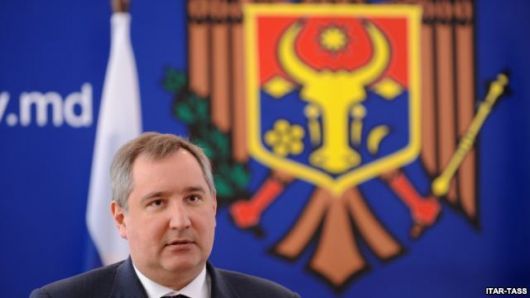
Russia and the Moldovan Communists’ Red October (Part Two)
Publication: Eurasia Daily Monitor Volume: 10 Issue: 177
By:

Last month, the Kremlin snapped its fingers and Armenia turned its back on Europe literally overnight, choosing to join the Russia-led Customs Union instead of concluding association and free-trade agreements with the European Union (see EDM, September 6, 11, 18). The Russian government is almost certainly looking at instruments and openings for turning Moldova around, from the EU toward Russia and a Eurasian construct.
The Kremlin launched its efforts to reorient Armenia and Moldova on the same day, September 2. On that date, Armenian President Serzh Sargsyan flew to Moscow at President Vladimir Putin’s invitation to embrace the Eurasian choice. And on that same date, Putin’s special envoy, Deputy Prime Minister Dmitry Rogozin, landed in Moldova to threaten reprisals against that country’s European choice.
Moldova’s situation, however, differs essentially from Armenia’s, presenting the Kremlin with quite another mix of challenges and opportunities that necessitate a far more sophisticated Russian policy.
Russia’s goal in Moldova cannot be to accomplish a sudden volte-face, but rather to slow down the Moldova-EU integration process, discrediting it and bringing it to a grinding halt. Toward that goal the Kremlin can use economic coercion (which it has already threatened), deploy economic incentives of its own (which it has yet to offer in any coherent way), promote Russian takeovers of key economic assets to negate Moldova’s European orientation (with Moldovan hands facilitating such Russian takeovers), further destabilize Moldova’s fractious politics and inter-ethnic relations (so as to prevent the formation of an internal pro-EU consensus), agitate against European “moral decadence” through the medium of the Russian Orthodox Church (to which most ethnic Moldovans inertially belong), and threaten Moldova with the definitive loss of Transnistria (without offering a positive incentive on Transnistria conflict-resolution as yet).
In Chisinau and Tiraspol on September 2–3 (see EDM, September 4), Rogozin issued a series of direct and indirect warnings against Moldova. Should its government go ahead and conclude the agreements with the EU, Rogozin declared, Moldovan exports would lose access to Russia’s market; Moldova might suffer during winter without Russian gas supplies; Moldovan migrant workers could face administrative hardships in Russia; and the Transnistria “wagon” would be de-coupled from Moldova’s “train” if the latter proceeds toward Europe. Attending a pro-Eurasia conference in Chisinau, Rogozin termed the participants as “the thinking part of the Moldovan people.”
During the first week of September, the head of the Russian Orthodox Church, Patriarch Kirill of Moscow and All Russia, paid a pastoral visit to Moldova. While avoiding politicized statements, Kirill’s visit served to consolidate the Russian Church’s influence on the Moldovan faithful, i.e., on mass voters. With this in mind, the government and other politicians had to go out of their way to show deference to Kirill. Within Moldova’s own Metropolitanate (canonically subordinated to the Moscow Patriarchate), a vocal faction agitates against the spread of European “moral decay” to Moldova.
On September 10, Russia’s consumer goods inspectorate (Rospotrebnadzor) head and chief epidemiologist, Gennady Onishchenko, announced the suspension of all Russian imports of Moldovan wines (traditionally Moldova’s number one export article). During the following days, Onishchenko warned that Russia might suspend imports of other Moldovan agricultural products also on sanitary and phytosanitary grounds. Russian customs returned some consignments of Moldovan fruits and vegetables. On September 19, during the Valdai Discussion Club meeting, Putin sarcastically deprecated Moldovan wine and predicted that it could not find markets in Europe (Interfax, September 19).
On September 23, Moldova’s Deputy Prime Minister and Economics Minister Valeriu Lazar reported that Gazprom had consented to prolong the supply agreement with Moldova by one more year, as a result of negotiations just held by Lazar in Moscow. The existing, five-year agreement was signed in 2006 and has been extended from year to year after its expiry. On the eve of his Moscow visit, Lazar had publicly proposed that Moldova turn over its gas distribution network to Gazprom in order to offset Chisinau’s arrears for past deliveries. Such a hasty step, however, is not supported by the coalition government’s majority and seems unwarranted as long as Gazprom does not seek to collect Tiraspol’s arrears, which are tenfold larger than Chisinau’s (Interfax, September 30).
On September 30 the spokeswoman of Russia’s Migration Service, Zaluna Kornilova, warned that a large number of Moldovan guest workers are liable to be banned from Russia for noncompliance with Russian laws and labor market regulations. This first warning is relatively soft, as it does not envisage an outright expulsion of offenders in most cases, but rather the interdiction of their return to Russia after the expiry of their existing labor contracts. The actual figure of Moldovan workers in Russia and the value of their remittances are not known, but they are estimated to number in the hundreds of thousands, and their remittances are crucial to keeping Moldova’s economy at least afloat. On October 2, an obviously concerned Moldovan Prime Minister Iurie Leanca telephoned Russian Prime Minister Dmitry Medvedev to ask yet again for a migrant labor protection agreement to be negotiated between Russia and Moldova. The Kremlin has declined this Moldovan plea for years. Medvedev responded evasively to Leanca’s latest plea (Kommersant, September 30; Kommersant.md, October 2; RFE/RL, September 30, October 3, 4).
The Moldovan Communist Party is poised to exploit the government’s predicament. The Communists’ “velvet revolution” campaign (see Part One, EDM, October 3) seeks to paralyze the political system and destabilize governance as such, ahead of the November 27–28 Eastern Partnership summit in Vilnius, where the EU-Moldova agreements are to be initialed. The Communists’ and Moscow’s respective time-tables, however, extend beyond Vilnius. Should they fail to block the association agreement’s initialing, they would probably intensify their efforts to block the agreements’ signing and ratification by Moldova in 2014.




